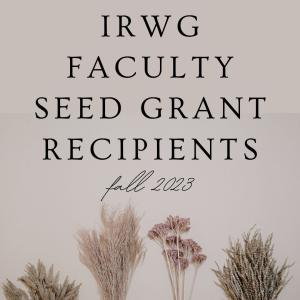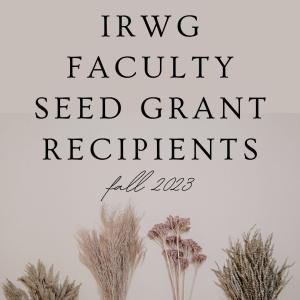IRWG Faculty Seed Grant Awards, Fall 2023


Established in 1996, IRWG Faculty Seed Grants are designed to stimulate gender research across U-M campuses. These grants support individual and collaborative research projects across disciplines.
This year, IRWG has two cycles for Seed Grant proposals: Fall 2023 and Winter 2024. The next deadline is February 23, 2024 for the winter cycle.
Recipients from the fall application cycle were notified of their awards in early January. Awarded projects include: a research study on how reproductive freedom influences elections in the post-Roe v. Wade era (Pamela Aronson and Lisa Martin, UM Dearborn); a qualitative study of how individuals living with endometriosis utilize social media to exchange support, learn, and engage in advocacy (Nazanin Andalibi, School of Information); a short documentary film about Nancy Savoca, the first commercially and critically successful Latina filmmaker in the U.S. (John Valadez, Dept. of Film, Television & Media); and a pilot study investigating how gender and social norms influence women’s engagement in HIV services in Kazakhstan (Elizabeth King, Public Health & LSA).
Project Details (in alphabetical order):
Pamela Aronson - Professor; Sociology and Women’s and Gender Studies; College of Arts, Sciences, and Letters; University of Michigan-Dearborn
Collaborator: Lisa Martin, Professor, Health and Human Services and Women's and Gender Studies, University of Michigan-Dearborn
Project Title: Reproductive Freedom on the Ballot: How Gender and Demands for Self-Determination are Driving Electoral Politics in the Post-Roe Era
Recent years have seen an increase of women and people of color in electoral politics, new social movement activism (Women’s March, #MeToo, and Black Lives Matter), polarization around reproductive freedom and LGBTQ rights, and a widening gender gap in voting. Inspired by social movement theory, this project examines how reproductive freedom, and its intersections with race and sexuality, influence elections in the post-Roe v. Wade era. Data from elections aid in examining support for gender self-determination to contribute to understandings of gendered social change, political and social divisions, and the ways that new ideas become diffused throughout society.
Nazanin Andalibi - Assistant Professor; School of Information and Digital Studies Institute; College of Literature, Science, and the Arts; U-M
Project Title: An Intersectional Examination of Social Media’s Role in Navigating Life with Endometriosis
Endometriosis is intertwined with gender, race, and class among other identity aspects. Due to challenges and disparities in diagnosis and treatment, prevalent misconceptions about the disease, and its significant impact on quality of life, individuals living with endometriosis turn to social media to exchange support, learn, and engage in advocacy. However, it is unclear what role identity characteristics such as race, gender, class, and their intersections play in these online experiences. Using interviews and informed by intersectionality theory, this work investigates disparate benefits and harms resulting from participation (or lack thereof) in relation to endometriosis on social media.
John Valadez - Professor; Film, Television, and Media; College of Literature, Science, and the Arts; U-M
Collaborators include faculty, artists, and students at multiple institutions: Carleen L. Hsu (Film, Television and Media, U-M); Elia Lyssy (professional cinematographer); Mena Nasiri (Undergraduate student, Mechanical Engineering and Film, Television, and Media, U-M); Cristina Barriente (Undergraduate student, Statistics and Latina/o Studies, U-M); Solomon Trice (Undergraduate student, Anthropology and Film, Television, and Media, U-M); Chon Noriega (Professor of Film, Television, and Digital Media, UCLA); Mary Beltran (Professor, Radio, Film and Television, University of Texas, Austin); Charles Ramírez Berg (Professor, Media Studies, University of Texas, Austin); Clara E. Rodriguez (Professor, Sociology, Fordham University); Colin Gunckel (Associate Professor, American Culture and Film, Television, and Media, Chair of the Department of Film, U-M).
Project Title: Savoca
This short documentary film centers around pioneering filmmaker Nancy Savoca. The first commercially and critically successful Latina filmmaker in the U.S., she gained national acclaim at a time when Latina authorship was nearly non-existent in fiction films. Savoca was at the vanguard, opening the way for the first generation of successful Latina directors in Hollywood. Her work presented stories from a Latina perspective; grappling with issues of family, gender and race, women and immigration, and reproductive autonomy in ways that both spoke to and challenged national audiences.
Elizabeth King - Associate Professor of Health Behavior and Health Education & Global Public Health; School of Public Health; Director of Russian, East European and Eurasian Studies at the College of Literature, Science, and the Arts; U-M.
Collaborators: Dr. Zhamilya Nugmanova of Asfendiyarov Kazakh National Medical University.
Project Title: The influence of gender and social norms on women’s engagement in HIV services in Kazakhstan
This qualitative pilot study investigates how gender and social norms influence women’s engagement in HIV services, including prevention of mother-to-child transmission, in Kazakhstan. While the HIV epidemic continues to expand in the country, gender analyses are limited, and women-specific needs are not always apparent in the policies and programming. This project conducts a gender analysis of current HIV policies and protocols and in-depth interviews with women living with HIV in Almaty, Kazakhstan, in order to inform future research and interventions to improve HIV services for women.
